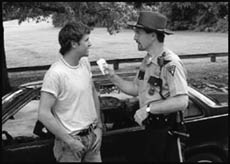The fourth amendment is a real thing,” said Guilford alumnus Scott Morgan as he introduced the Flex Your Rights video “Busted: The Citizen’s Guide to Surviving Police Encounters.” Flex Your Rights is an educational nonprofit organization. The mission statement reads: “Flex Your Rights Foundation is a group teaching people to understand, appreciate, and assert their constitutional rights during police encounters.”
Morgan returned to Guilford March 21 as the Associate Director for the Flex Your Rights organization. He provided an introduction to “Busted” and led a question-and-answer session following the video.
“Your rights mean nothing unless you exercise them,” said Morgan via e-mail. “‘Busted’ teaches basic information that lawyers and police officers tell their kids. Every patriotic American should know and exercise their constitutional rights during police encounters.”
Flex Your Rights has existed for three years. During his introduction to “Busted”, Morgan explained that Flex Your Rights came into existence for need-based purposes.
Many students were being arrested, resulting in them losing scholarships and financial aid. “We discovered that these students were getting arrested because they were waiving their rights during police encounters,” said Morgan in the introduction.
“I think it is really cool that Flex Your Rights got started out of the need to educate,” said senior Rachel White, who did publicity for the program.
About 50 people attended the showing of “Busted” in the Leak room.
“I thought it was a good crowd,” said White. “Not (just) quantity, but quality. I thought that everyone that showed up had good questions.”
Ira Glasser, retired Director of the American Civil Liberties Union (ACLU), provides narration for “Busted”. The video shows how to demonstrate your rights during police encounters involving traffic stops, street stops and at your door. “Busted” explains each example through a sketch involving young people and police officers.
The first example includes a young man being pulled over in his car, perhaps the most common incident in which people are misinformed on what rights they have. The Flex Your Rights website reports that “between July 1, 2002, and November 30, 2002, 99% of drivers stopped by police in Los Angeles consented to officers’ search requests.”
Glasser emphasized that you do not have to consent to a search as ‘Do not consent’ flashed across the screen in red letters.
The Guilford audience reacted with laughs of familiarity to the situational examples in “Busted”. Each scene demonstrated an incident in which individuals unknowingly waived their rights. The incident was redone, showing how to handle the situation while enforcing knowledge of your rights.
“The video emphasized the fact that you should remain informed and recognize the rights you have,” said White.
“I think it is a very good instructional video that informs people of their rights and perhaps will give them the courage to flex their rights,” said Jerry Joplin, justice and policy studies professor, via e-mail.
“Busted” is geared toward traditional college-age individuals, incorporating familiar situations and crucial information.
Attendees were encouraged to pick up informational pamphlets on Flex Your Rights, NORML (National Organization for Reform of Marijuana Laws) and StoptheDrugWar.org. Buttons and stickers reading ‘Stop The Drug War’ were also available.
During the video, Glasser suggests that, “‘I don’t consent to any searches’ may be one of the most important lines of your life.”
“‘Busted’ has been shown on hundreds of college campuses, both in classrooms and at public events hosted by students organizations,” said Morgan via e-mail. “There have also been dozens of community events around the country hosted by social justice groups and concerned citizens.”
Morgan contacted Flex Your Rights after he graduated Guilford in 2003 with a criminal justice degree. After completing an internship, he was hired in the fall.
“It was really nice that we had the opportunity to do something like this,” said White. “It is nice that we are able to sponsor something as an institution to advocate students learning.

